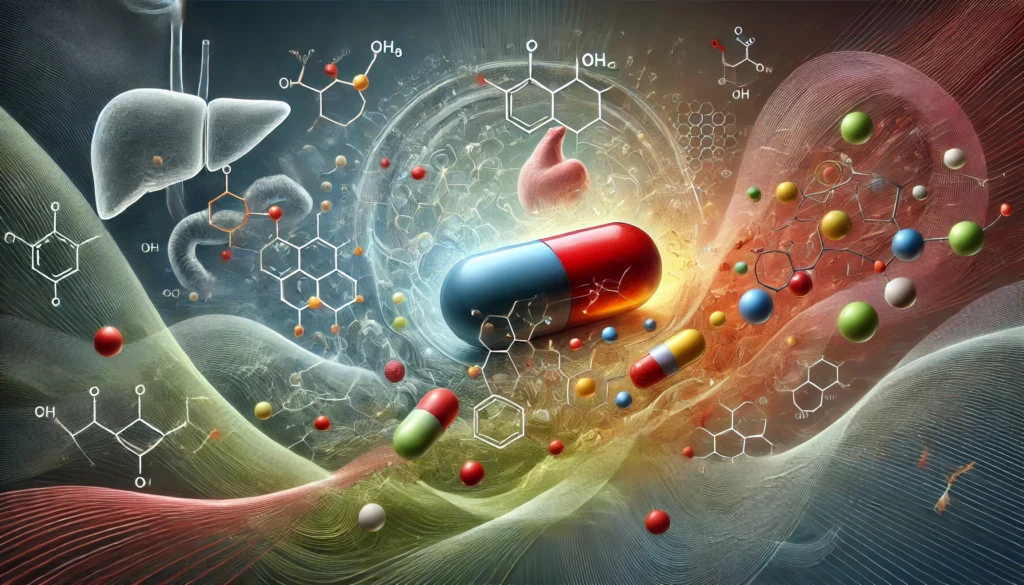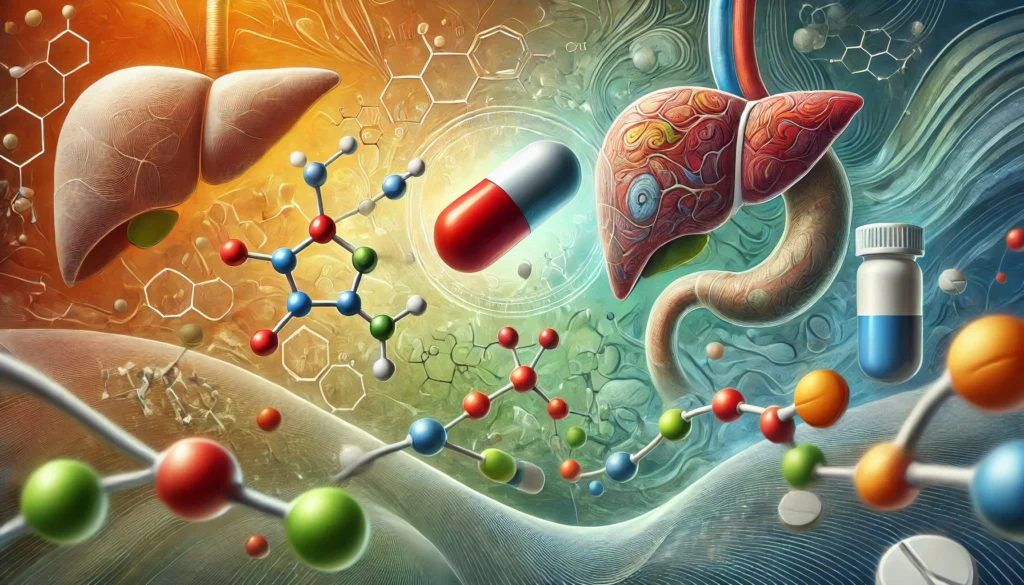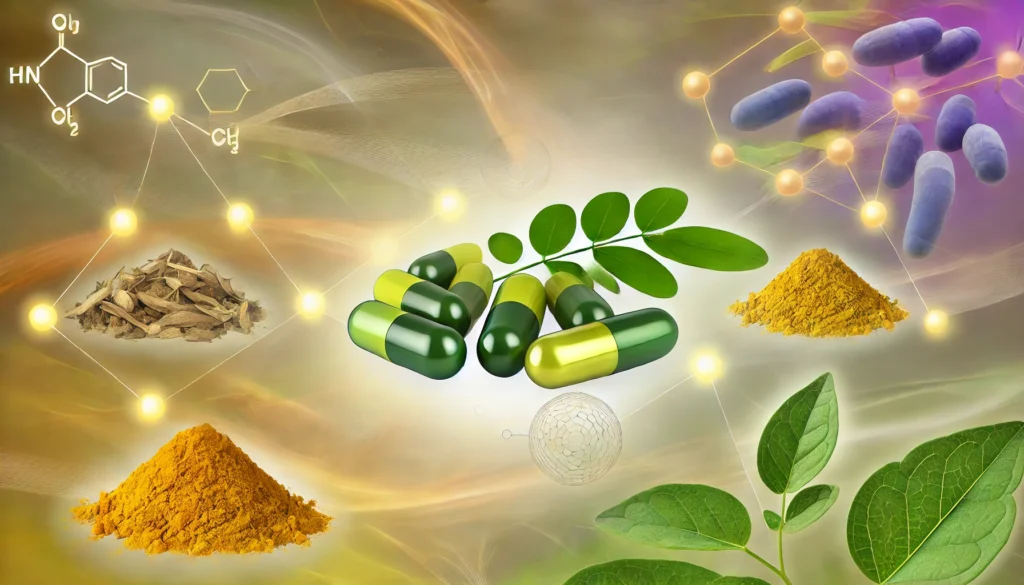Moringa oleifera, commonly known as Moringa, has risen to prominence as a highly touted supplement in the health and wellness sphere. Moringa originates from the Moringa tree—a plant native to parts of Africa and Asia. It has been utilized for centuries due to its rich nutritional profile and medicinal properties. Moringa is packed with vitamins, minerals, antioxidants, and anti-inflammatory compounds, making it a powerful supplement for boosting overall health. Its parts, including leaves, seeds, and pods, are used in various forms: powders, capsules, and teas, to cater to a growing audience seeking natural ways to improve their health and wellbeing.
The growing appeal of Moringa is evidence of a larger trend in which people are using natural supplements to improve their diets and exercise regimens. There are several reasons why people use Moringa supplements, such as increased energy, immune system support, weight loss support, and better skin health. The plant’s broad appeal as a superfood is attributed to its high concentration of nutrients, which include potassium, iron, vitamin C, and vitamin A.
Nonetheless, given the growing popularity of Moringa supplements, it’s important for you to know how they interact with other medications and dietary supplements. Not all natural products are safe for everyone, particularly when using supplements along with prescription or over-the-counter drugs. Medication ineffectiveness, heightened risk of adverse effects, and other unforeseen health problems might result from interactions between supplements and prescription drugs. Therefore, to ensure your safe consumption of Moringa, especially for people with pre-existing health conditions or those taking several drugs, a deeper understanding of how Moringa interacts with other chemicals is needed.
This is why it’s critical that consumers, medical professionals, and researchers have candid conversations regarding the advantages and possible drawbacks of Moringa, particularly how it may interact with other medications and dietary supplements. For people to be able to make educated decisions about include Moringa in their health routine, these kinds of discussions are essential for maximizing the plant’s advantages while minimizing its hazards.
You May Also Like:
Top 10 Best Moringa Supplements: In-Depth Reviews
Importance of Moringa Interaction
To truly comprehend Moringa, one must explore the breadth of its nutritional value and the range of health advantages it provides, while also realizing that its bioactive components call for prudence. This all-encompassing strategy guarantees that people may take use of Moringa’s benefits while being conscious of how it interacts with other substances.
Moringa’s Nutritional Profile
Since its so highly nutritious, Moringa oleifera is frequently referred to as a miracle tree. Many vitamins, minerals, and amino acids that are necessary for human health can be found in it. Vitamin A is essential for preserving good vision, immune system performance, and skin integrity. The most often used portion of the Moringa tree is its leaves. Packed with antioxidants that shield the body from oxidative stress, vitamin C, plentiful in Moringa, boosts immunological function. The body’s proper circulatory function and bone health are facilitated by significant potassium and calcium content, respectively.
Furthermore, Moringa leaves are a fantastic plant-based supply of iron, which is necessary for preventing anemia and raising energy levels by promoting the production of hemoglobin. Moringa is a useful supplement for vegetarians and vegans who want to improve their protein consumption because they also have a high protein concentration, which is uncommon for a plant.
Beyond its nutritional value, Moringa has many health benefits. Because of its antioxidant qualities, which are ascribed to substances like quercetin and chlorogenic acid, it aids in blood pressure regulation and inflammation reduction. Thanks to its high fiber content, Moringa has also been associated with better digestive health. Additionally, by improving fat metabolism, it may help with weight loss efforts.
Understanding Moringa’s Interactions
Despite the plant’s many nutritional and health benefits, a careful look at any potential interactions with medications and other supplements is necessary due to the bioactive components in Moringa. Several bioactive substances found in Moringa have the ability to alter the body’s biochemical pathways, which may have an impact on how medications are processed.
For instance, certain Moringa chemicals may either boost or decrease the activity of enzymes involved in drug metabolism, changing the efficacy of the drug or raising the possibility of negative effects. This is especially critical for people taking medicine for long-term illnesses like diabetes or hypertension, for whom stable dosage levels are essential to treatment.
Furthermore, the high vitamin K concentration of Moringa may cause problems when taken with blood-thinning drugs like warfarin. Although advantageous in numerous situations, its diuretic and anti-inflammatory characteristics may also interfere with anti-inflammatory and diuretic treatments, requiring your cautious handling and observation.
It is essential for both patients and healthcare practitioners to comprehend these connections. It emphasizes the value of holistic health management, in which dietary supplements, such as Moringa, are taken into account in relation to a person’s whole prescription and supplement regimen. It’s best to speak with a healthcare provider before adding Moringa to your diet, especially if you use medication or have pre-existing medical issues, to avoid any potential interactions and make sure you use it safely.
Moringa is a powerful supplement with a high nutritional profile and numerous health advantages. However, because of its bioactive ingredients, consumers and medical professionals need to be aware of possible drug and supplement interactions. By taking this cautious approach, the health advantages of Moringa can be completely enjoyed without posing a risk of negative interactions.

The Significance of Drug-Supplement Interactions
Expanding upon the context of interactions with Moringa, it is imperative for you to explore the wider domain of drug-supplement interactions in order to comprehend their importance, mechanisms, and possible outcomes. These interactions highlight the delicate balance that must be struck between taking use of supplements’ health benefits and making sure they don’t negatively impact the pharmacological activity of prescription drugs.
How and Why Drug-Supplement Interactions Occur
Drug-supplement interactions can be caused by a variety of biochemical processes, which might affect a medication’s pharmacodynamics—the way the drug affects the body—or pharmacokinetics—the way the body affects the drug. Numerous factors contribute to these interactions, most notably the complex chemical makeup of supplements that include a wide range of bioactive substances.
Pharmacokinetic Interactions: These happen when a supplement interferes with a drug’s distribution, metabolism, excretion, or absorption. For example, a supplement may speed up a drug’s liver metabolism, which lowers the drug’s bloodstream concentration and diminishes its effectiveness. On the other hand, if a supplement prevents a medicine from being metabolized, this may result in higher drug concentrations and a higher risk of toxicity.
Pharmacodynamic Interactions: These occur when a drug’s distribution, metabolism, excretion, or absorption are hampered by a supplement. A supplement might, for instance, hasten the liver metabolism of a medication, so reducing the drug’s bloodstream concentration and decreasing its efficacy. Conversely, larger drug concentrations and a higher risk of toxicity may arise if a supplement stops a medication from being digested.
Absorption Interactions: A medication’s ability to be absorbed into the bloodstream can be impacted by supplements that bind to medications in the digestive tract. This may considerably lessen the medication’s efficacy.
The bioactive substances found in supplements, which can interact with the body’s transporters, receptors, and enzymes that metabolize drugs, are frequently the cause of these interactions. For example, cytochrome P450 enzymes are an important family of enzymes in the liver that metabolize medications. Supplements containing substances that activate or inhibit these enzymes can change a drug’s metabolism dramatically.
Potential Consequences of Drug-Supplement Interactions
The consequences of drug-supplement interactions can range from mild to severe and can affect both the safety and efficacy of medications. Key outcomes include:
- Reduced Drug Efficacy: If a supplement accelerates the metabolism of a drug, it may decrease the drug’s concentration in the bloodstream to below therapeutic levels, rendering it less effective in treating the condition it was prescribed for.
- Increased Drug Toxicity: Conversely, if a supplement inhibits the metabolism of a drug, the drug’s levels can accumulate to toxic levels, potentially causing adverse effects and organ damage.
- Adverse Health Effects: In cases where supplements and drugs have additive or synergistic effects, patients may experience unexpected health issues. For example, combining supplements with blood-thinning properties with anticoagulant medications can lead to an increased risk of bleeding.
- Interference with Treatment Goals: Drug-supplement interactions can complicate the management of chronic conditions, interfere with the achievement of treatment goals, and increase the risk of medication non-adherence due to adverse effects.
It’s important that patients and healthcare professionals have candid conversations on supplement use given the potential for serious health effects, particularly when considering the use of supplements in conjunction with current treatment plans. This includes talking about using natural products that look harmless, like Moringa. In order to ensure that both prescription drugs and dietary supplements are used safely and effectively, it helps to take a proactive approach to identifying and managing drug-supplement interactions.

Mechanisms of Interaction
Examining the biochemical pathways and specific components that underlie the interactions between Moringa and medicines and other supplements is critical. Numerous bioactive substances, such as isothiocyanates, flavonoids, phenolic acids, and alkaloids, are found in Moringa oleifera. These substances each have specific functions in the body’s metabolic processes. Comprehending the possible interplay between supplements and drugs and Moringa is contingent upon these substances.
Isothiocyanates
Moringa contains sulfur-containing chemicals called isothiocyanates, which have anti-inflammatory and antibacterial qualities. The phase I and phase II enzymes involved in drug metabolism can have their activity modulated by them. In particular, isothiocyanates have the ability to stimulate or inhibit the CYPs enzyme family, which is essential for the oxidative metabolism of numerous medications. Isothiocyanates have the ability to change the pharmacokinetics of drugs by changing the activity of these enzymes, which may result in either greater toxicity or lower efficacy.
Flavonoids
The phytonutrients called flavonoids, which are abundant in Moringa, are known to have anti-inflammatory and antioxidant properties. They can affect how the body reacts to drugs in a number of ways. Drug transporters like P-glycoprotein (P-gp), which is important for the cellular efflux of pharmaceuticals, may be affected by flavonoids. Flavonoids may cause negative effects by increasing the absorption and systemic exposure of medications that are P-gp substrates by inhibiting P-gp.
Phenolic Acids
Phenolic acids found in Moringa, like chlorogenic acid, have antioxidant qualities. They can interact with medications by changing how fat and glucose are metabolized. For example, the impact of chlorogenic acid on glucose metabolism may interact with diabetic drugs, requiring dosage modifications to preserve glycemic control.
Alkaloids
Alkaloids found in Moringa, such as moringinine, have stimulating qualities akin to those of caffeine. These may interact with stimulant drugs, raising the possibility of elevated heart rate and blood pressure. Also, they may interact with sedatives, diminishing and counteracting their effects.
Pathways of Interaction
Moringa interacts with drugs and supplements mainly through biochemical pathways that change drug metabolism and transport mechanisms. Moringa has a major impact on the pharmacokinetic profiles of pharmaceuticals by affecting the enzymes and transporters involved in the ADME (Absorption, Distribution, Metabolism, and Excretion) processes of drugs. Moreover, Moringa’s bioactive components have the ability to interact with pharmacological targets, which may change the pharmacodynamic effects of prescription drugs.
To evaluate the possibility of drug interactions between Moringa and prescriptions, it is critical to comprehend these processes. It’s crucial to emphasize the value of all-encompassing management plans, especially for people with chronic illnesses or those on numerous prescription drugs. In order to minimize potential interactions and guarantee safe and efficient treatment regimens, healthcare providers should be aware of the usage of supplements like Moringa by their patients.

Moringa and Prescription Medications: Known Interactions
1. Interactions
Thanks to its many nutritional and therapeutic benefits, Moringa oleifera is already a mainstay in the supplement industry. Its interaction with prescription drugs, however, is a matter of worry. Although the precise interactions between Moringa and prescription drugs are still being studied, there are a number of incidences that have been reported and potential interactions that can be inferred from the pharmacological characteristics of the bioactive chemicals in Moringa. Blood thinners, blood pressure medications, and diabetic medications are the main pharmaceuticals involved in these interactions.
2. Diabetes Medications
The hypoglycemic qualities of Moringa have been reported to have an impact on blood sugar levels. Isothiocyanates and flavonoids, which can increase insulin secretion and activity, improve glucose tolerance, and decrease insulin resistance, are mainly responsible for this impact. Moringa may improve the glucose-lowering effects of diabetes drugs like metformin or sulfonylureas when used together. Hypoglycemia, or low blood sugar, may result from this synergistic interaction, requiring careful monitoring of blood sugar levels and potentially adjusting the dosage of diabetes medication.
3. Blood Thinners (Anticoagulants)
Significant levels of vitamin K are present in Moringa, particularly in its leaves. An essential component of blood clotting processes is vitamin K. Consuming Moringa could reverse the anticoagulant effects of blood thinners such as warfarin, which function by preventing the effects of vitamin K. This antagonistic relationship may cause the blood thinner to be less effective, which would raise the risk of blood clots. Therefore, in order to prevent jeopardizing the efficacy of their anticoagulant medicine, patients should control their intake of Moringa under the supervision of a medical practitioner.
4. Blood Pressure Drugs
The benefits of Moringa on hypotension (reducing blood pressure) have been well-documented, and its bioactive components, including as quercetin, can widen blood vessels and improve blood flow. Moringa may increase the effects of blood pressure drugs such as beta-blockers, ACE inhibitors, and calcium channel blockers when used together. Hypotension, or dangerously low blood pressure, can be the outcome of this synergistic relationship. Before including Moringa in their routine, those of you on blood pressure medication should use caution and speak with their healthcare practitioners.
Understanding the Nature of These Interactions
The interactions between Moringa and prescription medications can be broadly categorized into synergistic and antagonistic:
- Synergistic interactions occur when Moringa enhances the effects of a medication, as seen with diabetes medications and blood pressure drugs. While synergistic effects can sometimes be beneficial, they often require close monitoring and dosage adjustments to prevent adverse outcomes like hypoglycemia or hypotension.
- Antagonistic interactions are when Moringa’s effects counteract those of a medication, such as with blood thinners. These interactions can compromise the therapeutic efficacy of medications, potentially leading to serious health risks.
Moringa and Over-the-Counter (OTC) Drug Interactions
When using both over-the-counter (OTC) medications and nutritional supplements, such as Moringa oleifera, those who want to manage their health concerns naturally should take these interactions into account. Well-known for its medicinal and nutritional qualities, Moringa may interact with over-the-counter medications such as acetaminophen (paracetamol) and nonsteroidal anti-inflammatory drugs (NSAIDs). It is essential to one’s health and safety to comprehend these interactions in order to reduce dangers and guarantee that Moringa is used safely in conjunction with these typical medications.
Interactions with NSAIDs
NSAIDs, like aspirin and ibuprofen, are frequently used to treat fever, reduce inflammation, and relieve pain. Because of its bioactive ingredients, such as isothiocyanates and quercetin, Moringa possesses anti-inflammatory qualities that can also relieve pain and reduce inflammation. Although this might appear advantageous, taking Moringa along with NSAIDs may have synergistic effects. This combination may increase the likelihood of gastrointestinal (GI) side effects linked to NSAIDs, including bleeding and ulcers. When coupled with NSAIDs, the anti-inflammatory properties of Moringa may make GI distress worse in susceptible people.
Advice: If you take NSAIDs for chronic diseases on a regular basis, speak with a doctor before adding Moringa to your routine. It could be prudent for you to keep an eye on the amount and timing of NSAIDs in addition to Moringa in order to prevent aggravating any possible side effects.
Interactions with Acetaminophen
Acetaminophen, or Tylenol, is frequently used to treat fever and relieve pain. It is processed in the liver and can cause damage to the liver if taken in excess. Additionally, Moringa influences the activity of liver enzymes, which may change how acetaminophen is metabolized. Because Moringa contains substances that affect liver enzymes, acetaminophen toxicity may be increased by slowing down its breakdown or reduced by speeding up its metabolism.
Advice: Combining Moringa with acetaminophen should be done with caution, especially in those who already have liver problems or who drink alcohol, which further strains the liver. Speak with a healthcare professional for specific guidance on when and how much Moringa to take while taking acetaminophen. If taking Moringa concurrently with acetaminophen, people might need to monitor their liver function tests more carefully or change their dosage.
Moringa and Herbal Supplement Interactions
Understanding the relationships between dietary supplements and herbal therapies, such as those containing Moringa oleifera, is crucial given the growing trend of including both into health regimens. Renowned for its nutritional and medicinal properties, Moringa may combine with other well-liked herbal supplements like turmeric, ginkgo biloba, and St. John’s wort. These interactions may impact the supplements’ overall safety and efficacy, which may compromise the intended health advantages.
Interaction with St. John’s Wort
The antidepressant and anti-anxiety qualities of St. John’s Wort make it a popular supplement. Because it stimulates the activity of cytochrome P450 enzymes (CYPs), which are necessary for drug metabolism, it is known to interact with a variety of drugs and supplements. Combining Moringa with St. John’s Wort may further change the metabolism of other drugs or supplements consumed because Moringa also includes substances that can modify the activity of CYP enzymes. The combination may result in a higher chance of adverse effects or a reduction in the effectiveness of drugs processed by these enzymes.
Potential Effect: It may be necessary to modify the dosages of other supplements or medications when using Moringa and St. John’s Wort together in order to preserve their efficacy and safety.
Interaction with Ginkgo Biloba
Ginkgo biloba is well known for its circulatory and cognitive effects; it is frequently used to enhance blood flow and memory. Ginkgo, like Moringa, has strong antioxidants and substances that influence blood coagulation and circulation. In particular for people on anticoagulant therapy or those with bleeding disorders, there may be an additive effect on blood thinning and circulation when taken simultaneously, which could increase the benefits but also the hazards.
Potential Effect: Due to their combined effects on blood circulation and thinning, vigilance and close observation may be necessary to prevent consequences such severe bleeding.
Interaction with Turmeric
Turmeric’s anti-inflammatory and antioxidant qualities make it popular due to its active ingredient, curcumin. Given their comparable positive effects on oxidative stress and inflammation, turmeric and Moringa may have synergistic health advantages. Still, like Moringa, turmeric can also impact drug metabolism enzymes and transporters. Other medications may become less safe or effective as a result of this interaction changing how they are metabolized.
Potential Effect: It is important to analyze the impact of the combination on the metabolism of other medications carefully, as it may require changing dosages, even though it may boost anti-inflammatory and antioxidant effects.

Overall Impact on Dietary Supplement Efficacy
The interactions between Moringa and other herbal supplements highlight the complex nature of combining multiple supplements. These interactions can:
- Enhance the therapeutic effects of supplements through synergistic actions, offering greater benefits than when each supplement is taken alone.
- Alter the metabolism and efficacy of each other or of other concurrent medications, potentially requiring adjustments in dosages or timing to maintain safety and effectiveness.
- Increase the risk of adverse effects, especially when synergistic actions lead to exaggerated responses, such as increased bleeding risk with blood thinners.
Special Considerations: Moringa and Multivitamins
There are a few specific things to keep in mind when adding Moringa oleifera to a diet that already includes multivitamins or mineral supplements. The nutritional profile of Moringa is highly acclaimed due to its abundance of vitamins, minerals, antioxidants, and phytonutrients. Although this makes Moringa a great dietary supplement to cover any nutritional shortfalls, there is a risk of overnutrition due to the overlap of nutrients between Moringa and regular multivitamins or mineral supplements. Because of this, it is necessary to carefully assess the combined dietary supplements in order to prevent exceeding the recommended daily allowances (RDAs) for specific nutrients, which may have harmful consequences on health.
Overlap in Nutrient Content
Among other nutrients, Moringa leaves are rich in calcium, potassium, iron, and the vitamins A, C, and E. At different quantities, these are also frequently found in multivitamin and mineral supplements. When these supplements are used in conjunction with Moringa, the consumption levels of certain nutrients—especially calcium and iron and vitamins A and E—may surpass the recommended daily allowances (RDAs).
Potential for Excessive Nutrient Intake
- Vitamin A Toxicity: Excessive intake of vitamin A can lead to hypervitaminosis A, characterized by symptoms such as nausea, dizziness, headaches, and in severe cases, liver damage and neurological symptoms.
- Iron Overload: While iron is essential for forming red blood cells and transporting oxygen, too much iron can lead to conditions like hemochromatosis, which can cause liver damage, diabetes, and heart problems.
- Hypercalcemia: Excess calcium intake can lead to hypercalcemia, with symptoms including kidney stones, kidney failure, abnormal heart rhythms, and bone pain.
Identifying High-Risk Groups
There are particular populations that may be more vulnerable to negative interactions when including Moringa oleifera into dietary habits because of their particular physiological state or pre-existing health issues. Depending on their age, health, or specific periods of life, some people may have mild to severe negative effects from Moringa. The hazards connected with consuming Moringa can be reduced by identifying these high-risk individuals and providing guidance.
1. Pregnant Women
When using supplements containing Moringa, pregnant women are recommended to proceed cautiously. Few studies have been conducted on the impact of the bioactive chemicals in Moringa during pregnancy, despite the plant’s rich nutrient profile. Specifically, the chemicals that may cause unfavorable pregnancy outcomes by stimulating uterine contractions are of concern.
Guidelines: In order to achieve their nutritional demands, pregnant women should think about other, thoroughly researched nutritional sources and speak with medical professionals before incorporating Moringa into their diet.
2. Breastfeeding Women
There are few conclusive studies on the safety of Moringa during breastfeeding, despite the plant’s reputation for helping nursing mothers produce more milk. The transfer of bioactive substances to the infant is a cause for concern, as their consequences are not fully understood.
Guidelines: Before ingesting Moringa, lactating mothers should consult a doctor and keep a close eye out for any negative effects on either themselves or their unborn child.
3. Individuals with Allergies
Moringa can cause reactions in people who have a history of allergies to plants in the Moringaceae family. From minor skin rashes to more serious symptoms like breathing difficulties, allergic reactions can take many different forms.
Guidelines: People who are allergic to plants should begin with a limited amount under medical supervision, or if a specific allergy to the plant is recognized, then avoid Moringa completely.
4. Children
There isn’t much research on Moringa’s safety for kids. It is unknown how the concentrated bioactive chemicals in Moringa would affect children’s developing systems because their bodies metabolize nutrients and substances differently than those of adults.
Guidelines: Before providing children with Moringa, parents should speak with pediatricians and take established nutritional requirements into consideration.
Individuals with Certain Health Conditions
1. Blood Coagulation Disorders
Due to Moringa’s potential effects on blood clotting, individuals with blood coagulation disorders or those on blood thinners should be cautious, as Moringa may exacerbate bleeding risks.
2. Diabetes
Moringa’s hypoglycemic effects may require adjustments in diabetes medication dosages to prevent hypoglycemia, necessitating close blood sugar monitoring.
3. Kidney Disorders
The high potassium content in Moringa could pose risks for individuals with kidney disorders, potentially leading to hyperkalemia.
Guidelines for Health Conditions: Only under the supervision of a healthcare professional who is qualified to monitor the patient’s condition and modify treatment plans as needed should anyone with pre-existing medical conditions use Moringa.
Monitoring and Managing Interactions
In particular, for patients who are managing numerous drugs or chronic diseases, it is crucial to monitor and manage potential interactions between pharmaceuticals and dietary supplements such as Moringa oleifera. In order to optimize supplement advantages while lowering hazards, patients and healthcare professionals play crucial roles in this process. Another important participant in this dynamic is the pharmacist, who provides patients with information and specialist knowledge on drug-nutrient combinations.
Tips for Healthcare Providers
1. Comprehensive Patient History
- Encourage Open Dialogue: Make it a standard practice to ask patients about their use of dietary supplements, including Moringa, in addition to their prescribed and over-the-counter medications.
- Update Regularly: Keep patient medication and supplement histories up to date, considering changes in dosages, frequency, and the introduction of new supplements.
2. Educate Patients
- Provide clear information on the potential risks of combining supplements with their medications and the importance of communication about any new supplements they are considering.
3. Monitor for Adverse Effects
- Schedule regular follow-ups to monitor for signs of interactions, such as changes in blood pressure, blood sugar levels, or unexpected side effects.
4. Interdisciplinary Collaboration
- Collaborate with pharmacists and dietitians to provide a holistic approach to patient care, especially for individuals with complex medication regimens or those at higher risk of interactions.
Tips for Patients
1. Open Communication
- Always inform your healthcare providers, including doctors and pharmacists, about all the supplements you take, emphasizing any new supplements you start or plan to start.
2. Keep a Medication and Supplement Diary
- Document your medication and supplement intake, including dosages and timing, to share with your healthcare provider during appointments.
3. Be Informed
- Seek reliable information on your supplements and medications, and don’t hesitate to ask your healthcare provider or pharmacist questions about potential interactions.
4. Monitor Your Body
- Pay attention to how your body responds to the combination of supplements and medications, and report any adverse effects or changes to your healthcare provider promptly.
Role of Pharmacists
Pharmacists occupy a vital position in the healthcare system, acting as a bridge between patients and their complex medication regimens, and providing information on the safe use of supplements and drugs.
1. Medication Therapy Management (MTM)
- Pharmacists can offer MTM services, reviewing patients’ medication and supplement regimens to identify potential interactions, duplication, or contraindications.
2. Patient Education
- They provide detailed counseling on the proper use of medications and supplements, including the best times to take them, potential side effects, and how to monitor for adverse reactions.
3. Collaboration with Healthcare Team
- Pharmacists work closely with doctors and other healthcare professionals to manage and adjust medication regimens based on patient needs and the potential for interactions.
4. Staying Informed
- Keeping abreast of the latest research and information on dietary supplements and their interactions with medications enables pharmacists to give up-to-date advice.
Healthcare professionals, patients, and pharmacists may efficiently manage and keep an eye out for any possible conflicts between dietary supplements like Moringa and pharmaceuticals by encouraging open communication, education, and teamwork. By taking preventative measures, patients can safely benefit from their supplement and prescription regimes, improving their general health and well-being.
Moringa’s potential drug and supplement interactions: Final verdict
Moringa is powerful and multifaceted. As such, perhaps extra due diligence is required before supplementing with it. Please be comprehensive in your research and your disclosure of health issues with healthcare providers before supplementing with Moringa due to its ability to affect people differently depending on their pre-existing health conditions. Moringa has an extensive history regarding its capacity to improve many areas of health. Remember, it is called a “miracle tree” because of its potential.

References:
- “Effect of Moringa oleifera Lam. leaf powder on the pharmacokinetics of nevirapine in HIV-infected adults: a one sequence cross-over study.” Retrieved from: https://www.ncbi.nlm.nih.gov/pmc/articles/PMC5348890/
- “Isolation, synthesis, and drug interaction potential of secondary metabolites derived from the leaves of miracle tree (Moringa oleifera) against CYP3A4 and CYP2D6 isozymes.” Retrieved from: https://pubmed.ncbi.nlm.nih.gov/31301970/
- “The Impact of Moringa oleifera Supplementation on Anemia and other Variables during Pregnancy and Breastfeeding: A Narrative Review.” Retrieved from: https://www.ncbi.nlm.nih.gov/pmc/articles/PMC10301989/
- “The anticancer potential of chemical constituents of Moringa oleifera targeting CDK-2 inhibition in estrogen receptor positive breast cancer using in-silico and in vitro approaches.” Retrieved from: https://bmccomplementmedtherapies.biomedcentral.com/articles/10.1186/s12906-023-04198-z
- “Moringa oleifera: An Updated Comprehensive Review of Its Pharmacological Activities, Ethnomedicinal, Phytopharmaceutical Formulation, Clinical, Phytochemical, and Toxicological Aspects.” Retrieved from: https://www.ncbi.nlm.nih.gov/pmc/articles/PMC9916933/#:~:text=Moringa%20oleifera%20(M.,%2C%20and%20Pakistan%20%5B1%5D
Important Note: The information contained in this article is for general informational purposes only, and should not be construed as health or medical advice, nor is it intended to diagnose, prevent, treat, or cure any disease or health condition. Before embarking on any diet, fitness regimen, or program of nutritional supplementation, it is advisable to consult your healthcare professional in order to determine its safety and probable efficacy in terms of your individual state of health.
Regarding Nutritional Supplements Or Other Non-Prescription Health Products: If any nutritional supplements or other non-prescription health products are mentioned in the foregoing article, any claims or statements made about them have not been evaluated by the U.S. Food and Drug Administration, and such nutritional supplements or other health products are not intended to diagnose, treat, cure, or prevent any disease.


